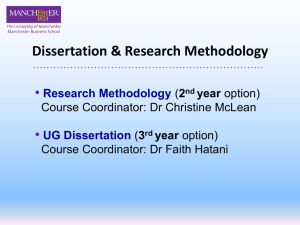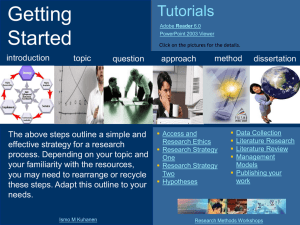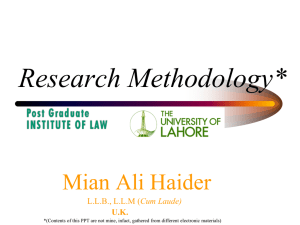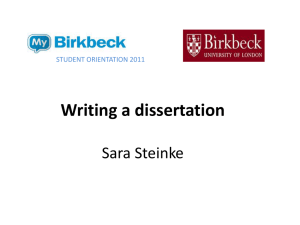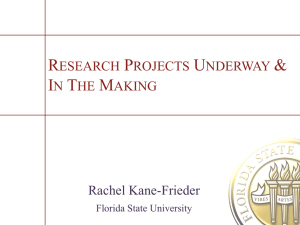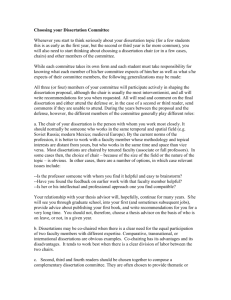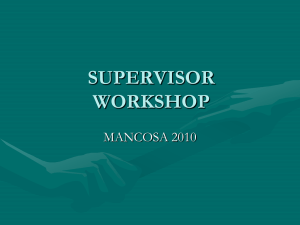Msc Thesis Project Guide.
advertisement
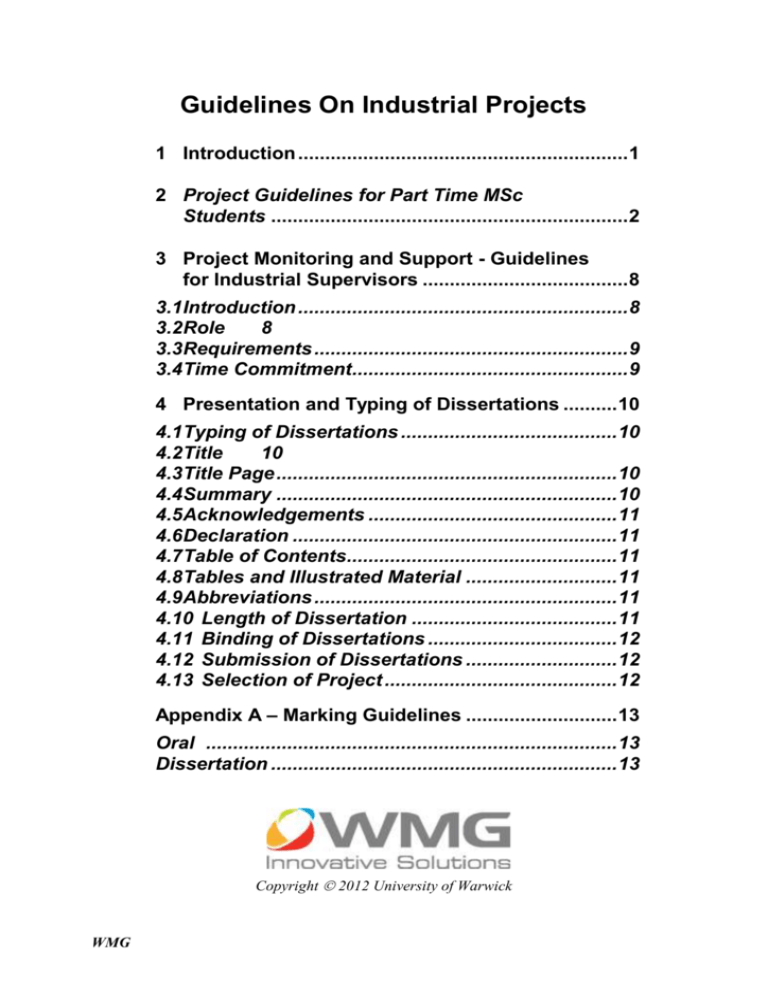
Guidelines On Industrial Projects 1 Introduction ............................................................. 1 2 Project Guidelines for Part Time MSc Students .................................................................. 2 3 Project Monitoring and Support - Guidelines for Industrial Supervisors ...................................... 8 3.1Introduction ............................................................. 8 3.2Role 8 3.3Requirements .......................................................... 9 3.4Time Commitment................................................... 9 4 Presentation and Typing of Dissertations .......... 10 4.1Typing of Dissertations ........................................ 10 4.2Title 10 4.3Title Page ............................................................... 10 4.4Summary ............................................................... 10 4.5Acknowledgements .............................................. 11 4.6Declaration ............................................................ 11 4.7Table of Contents.................................................. 11 4.8Tables and Illustrated Material ............................ 11 4.9Abbreviations ........................................................ 11 4.10 Length of Dissertation ...................................... 11 4.11 Binding of Dissertations ................................... 12 4.12 Submission of Dissertations ............................ 12 4.13 Selection of Project ........................................... 12 Appendix A – Marking Guidelines ............................ 13 Oral ............................................................................ 13 Dissertation ................................................................ 13 Copyright 2012 University of Warwick WMG Guidelines on Industrial Projects Page 1 1 Introduction This document covers dissertations for: MSc in Automotive Technology A requisite part of the study programme is an industrially oriented project for which a final report is submitted in the form of a dissertation. The dissertation is a comprehensive report embracing the technical, economic and human aspects of engineering business. It is defined in the University Regulations as follows: "A dissertation submitted in part fulfilment of the requirements for the award of a Master's degree shall constitute an ordered, critical and reasoned exposition of knowledge in an approved field and shall afford evidence of knowledge of the relevant literature, and be submitted in accordance with the appropriate course regulations." Normally, project selection should be completed around 18 months into your registration. The project must be approved by the University and it must be equivalent in effort to a minimum of six units of credit. An academic supervisor, and an industrial supervisor where the project is externally based, will be appointed to monitor each project. The project and dissertation must be assessed separately from the modules. The academic supervisor will be responsible to the Director of Studies for the assessment of the project and the dissertation, for conducting the oral examination, and the forwarding of the assessment. The marking matrix to be used for the assessment of the project, the dissertation and the oral examination is explained in the "Project Guidelines for Part-Time MSc Students" document. The format in which the dissertation should be presented is detailed in the "Presentation and Typing of Dissertations for MSc". WMG Guidelines on Industrial Projects Page 2 2 Project Guidelines for Part Time MSc Students The aspects of your project you need to be aware of are covered below. 1. Around 12 to 18 months after first registering on the MSc course you should identify a suitable topic to form the basis of your project and dissertation. This should be done in consultation with your Managers and your Company Training Department. A Research Methods module is available at a nominal fee (covering project definition, project planning, accessing public domain information and writing academic documents). It is strongly recommended that participants attend this day approximately 12 to 15 months into their registration period. Bookings can be made through the Programme Secretary, who can also advise on the current fee. 2. Your project topic can be selected from a wide spectrum of technical and engineering/process business subjects, however, choice may be constrained by your own company policy. The dissertation should be a comprehensive report embracing technical, economic and human aspects of engineering/process business and their interaction. It is essential that the dissertation submitted is relevant to the degree for which you are registered. Advice on relevance of proposed project/dissertation topic to degree stream can be sought from the Projects Manager. The dissertation should be an exposition of your work and ideas. Where others have had an input (eg in a teamwork situation) this should be clearly identified. Since the subject areas of dissertations can be so diverse it is impossible to define a standard approach to content, however, this should include an introduction and definition of objectives, a literature survey, and a review of the problem followed by a description of your approach to solving the problem, your results or findings, an intellectual analysis of your results or findings and, finally, a logical review of the conclusions you have drawn. 3. Advice and guidance on company policy should be sought from your Training Officer, whilst advice on the University requirements and suitability of topics can be sought from the Projects Manager. 4. Having selected a subject area for your project it is your responsibility to find someone prepared to act as your Industrial Supervisor. The role of the Industrial Supervisor is as follows:(i) To monitor progress on the project over a period normally of 9 to 18 months in order to be able to assess effort, competence and comprehension. (ii) To liaise with the Academic Supervisor to ensure that the project is directed so as to be industrially relevant and academically suitable. WMG Guidelines on Industrial Projects Page 3 (iii) To read and assess the completed written report with regard to quality, content and presentation. (iv) To jointly (with the Academic Supervisor) conduct an oral examination to assess overall breadth and depth of knowledge. 5. The Industrial Supervisor should be a suitably qualified, senior individual within the company who has a knowledge of the circumstances surrounding the project and who can judge the relevance of methods used and conclusions drawn in relation to normal company practices and current and future business objectives. 6. Since the Industrial Supervisor is responsible for deciding marks which affect the awarding of a degree, the University stipulates that the Industrial Supervisor should meet the following requirements:(a) The person should normally have a degree or an equivalent professional qualification. (b) The person should occupy a significant position of authority and responsibility. (c) The person should have a significant awareness of the project and be in a position to assess an individual's performance on the project. (d) The person should not be a current student of the University of Warwick 7. Points (b) and (c) above normally mean that an Industrial Supervisor should be in a fairly senior position but not so senior as to be remote from the detail of the project. As a guide, supervisors are usually 1 to 3 levels higher than the student within the management hierarchy. Advice may be sought from the training department concerning suitable supervisors. 8. You should approach a prospective supervisor and should explain your requirements with the aid of "Information for Industrial Supervisors", issued with this note. You should obtain agreement on the content of the project and the supervisors agreement to fulfil the role outlined in Section 4 above. 9. Having identified an Industrial Supervisor you should, with their agreement, write a brief synopsis of your project proposal headed with your name, your Industrial Supervisors name, contact addresses and phone numbers together with your Industrial Supervisors qualifications and company position. This should be followed by the project title and a clear statement of the objectives of the project and the way in which you will satisfy these objectives. A standard form for the project proposal (in electronic form) is available from the Projects Manager. WMG Guidelines on Industrial Projects Page 4 10. After clearing the proposal with your company you should send the proposal to the Programmes Secretary, Arden House, University of Warwick, before the end of your first year of registration. 11. Your proposed topic will be considered along with your nomination of an Industrial Supervisor. If both are acceptable a suitable Academic Supervisor will be appointed and you will be notified by post and asked to contact both supervisors to arrange an inaugural meeting. 12. If the project proposal is unacceptable you will be asked to submit a new one. 13. The initial tripartite meeting to discuss your project should ideally be arranged at your place of work so that your Academic Supervisor can become acquainted with the environment in which the project is to be conducted. The meeting should allow the project to be discussed thoroughly, for all parties to resolve any outstanding questions and to specify project milestones and agree a timetable for their achievement. It is useful at this stage to discuss proposed chapter titles and contents to give both supervisors a feel for the extent of coverage and depth of the planned work. 14. Following the initial meeting, the student should regularly report progress to the Supervisors: liaison with the Academic Supervisor can be arranged via the telephone for lunch hour meetings during module attendance at the University of Warwick. There should be no problems in keeping the Industrial Supervisor up-to-date. In the event of a major problem a tripartite meeting should again be initiated: e.g., if the direction of the project has to be changed as the result of new findings or a change occurring in company circumstances, etc. Regular liaison with the Academic Supervisor is strongly advised in order to ensure the project attains a suitable academic content. 15. You should aim to have gathered all the necessary information to complete the project by the end of the second year of registration. This should include a literature survey in the chosen area of your project. The literature survey can be carried out through your company Library, the Warwick University Library or elsewhere. Advice on literature searches can be sought from your Academic Supervisor or from the University of Warwick Library Staff. On-line computer searches using databases can be carried out in the Warwick Library. It is also possible to access these databases remotely via the University of Warwick internet site, and assistance can be obtained from the I.T. Help & Advisory desk on 024 7652 3675. Computing Facilities are available in Arden House for this purpose. Texts or papers identified in this way may be held in and borrowed from Warwick Library, or may be borrowed through Document Supply (formerly Inter Library Loans). The General Enquiries number (opening times etc.) for the library is 024 7652 4103. 16. You should submit, in draft form and as early as possible, a substantial portion of your dissertation - for instance the introductory and literature review chapters together with WMG Guidelines on Industrial Projects Page 5 the proposed page of contents - to your supervisors to allow them to make comments on the content, structure, style and presentation of the dissertation and to allow you to incorporate their suggestions into subsequent chapters. You should plan a timetable for "writing up" your dissertation starting at the end of your second year of registration at the latest with a planned completion date well in advance of the end of your registration period. You are encouraged to continue submission of all of the chapters of your dissertation in draft form prior to typing and binding to ensure that the dissertation adequately reflects the quality of your efforts on the project. 17. During the last year of registration careful time management is essential. You are encouraged to plan to submit your dissertation well before your end of registration period, i.e., three months. This will allow for unforeseen problems such as minor illness, rewriting draft chapters, typing delays, typing corrections and binding. In particular you should liaise with your supervisors regarding their availability to carry out the proof reading task during this period. Experience has shown that the submission of your dissertation in draft form to supervisors for comment is a valuable practice in achieving a high quality of presentation and content. 18. Allocation of time and facilities for project work is at the discretion of the individual company but there are minimum commitments expected to ensure that students are enabled to successfully complete the project and dissertation requirements within the allotted time span. The Training Department should advise the students and their managers as to the degree and form of the Company commitments. 19. Detailed information regarding the format and order of contents of your dissertation are covered on the Research Methods module which you are strongly advised to attend. 20. Three copies of your dissertation conforming to course regulations should be produced. Two should be submitted to : The Programmes Secretary Engineering Management Building Kirby Corner Road University of Warwick Coventry CV4 7AL before the end of your registration period. These will be date stamped on receipt. The other copy should be passed directly to your Industrial Supervisor for their evaluation. The project submission Pro-Forma (example attached) must be bound in to at least one of the copies submitted to the university. 21. The end of your registration period is normally 3 years after the date of your registration and will either be the last day of March, June, September or December, depending on WMG Guidelines on Industrial Projects Page 6 the date of your original registration. The dissertation submission date will be last day of your registration period, or the first working day that the University is open thereafter. Extensions of registration periods are exceptional and are granted only in special circumstances such as prolonged periods of ill health or significant secondments abroad in the discharge of your employment duties. To apply for an extension a request in writing must be made, supported by separate letters from your Training Department and Senior Manager. The request must be supported and confirmed as reasonable by the project supervisors, and must include an action plan for completion. Your request will be considered by the executive committee and if deemed appropriate, representation on your behalf may be made to the Higher Degrees Committee of Senate with a request for extension to the registration period. Refer to the “Dealing with Problems” document for more details. 22. Penalties for late submission of the dissertation will be applied at the rate of 3% per University working day. 23. After submission of your dissertation you should make arrangements at a convenient time and place for a presentation and oral exam. The presentation will preceed the oral examination, and the purpose is to present and disseminate the key conclusions of the project as widely as possible within the company. You are responsible for inviting a company audience, which should include senior management. The oral exam following the presentation will involve questioning on the detail of the dissertation. The assessment of the dissertation and oral exam will be undertaken by your industrial and academic supervisors and a third academic assessor to ensure independence. The date set for the oral exam should allow all assessors sufficient time to read the completed dissertation, and should be within one month after the submission of the dissertation. 24. After conducting the oral exam your assessors will make comments and allocate marks for the project. Marking guidelines can be found in Appendix A. Comments and marks are awarded by the assessors against the following criteria: (a) Progress of Project Comments will be provided on: the diligence and competence in performing the task without excessive help; evidence of sustained activity and single mindedness of purpose throughout the period; and evidence of planned programme to a timetabled conclusion. No marks are allocated for the Progress Element of the project. (b) Oral/Presentation Assessment for the oral element will be on a pass/fail basis considering the structure of presentation and demonstration of grasp of problem during the question/answer session. (c) Project Dissertation WMG Guidelines on Industrial Projects Page 7 Marks and comments will be provided based on: thoroughness and penetration of review of past work and use of relevant literature; care of presentation, including that of diagrams; clarity of prose; organisation of report into a logical sequence of facts and opinions; choice of variables for analysis, the presentation of the data and the clarity with which trends in the data are displayed and explained to the reader; intellectual quality of analysis; discussion of results; conclusions; and suggestions for further work. 25. No corrections are allowed to the dissertation once it has been submitted; the dissertation as submitted will be assessed and forwarded to the Board of Examiners for consideration. The marks should normally be received before the end of the month following your submission. It is essential that your marks and dissertation are available by the above deadline otherwise they will not be forwarded to the subsequent Examination Board meeting and there will be a consequent delay of at least 6 months before they can be considered. 26. Informal feedback will be provided after the examination. However, all decisions are subject to Examination Board approval. Examination Boards normally meet in May and November and students will be officially informed shortly afterwards of their result. 27. Students who are awarded an MSc will be invited to the degree congregation following the Exam Board, and these are held in January and July. Students may however defer to the following congregation if they wish. WMG Guidelines on Industrial Projects Page 8 3 Project Monitoring and Support Guidelines for Industrial Supervisors 3.1 Introduction Part-Time students registered for an MSc degree must undertake an industrial project which should demonstrate an understanding of some of the technical, economic and human aspects of engineering business and their interaction, and must be relevant to the degree for which they are registered. This project is assessed and it contributes one third of the final marks on which the decision to award a degree is based. The other two thirds derive from post-module work associated with taught modules in various aspects of automotive technology. As the project represents a large amount of effort on behalf of the student (~ 600 hours) it is a significant undertaking. Benefit can accrue to both the company and industrial supervisor if the topic for investigation is carefully chosen. It is the intention that both the project and the resulting dissertation are of value to the company. Students must select a topic of their own choice and must then find within their company a person who is prepared and able to act as their 'Industrial Supervisor' during the course of the project. There is also an 'Academic Supervisor' who is a member of the University who has knowledge of the selected topic, and the monitoring and support of the project is the joint responsibility of the two supervisors. The role of the Industrial Supervisor is as follows:- 3.2 Role (i) To monitor progress on the project over a period normally of 8 to 16 months in order to be able to assess effort, competence and comprehension. (ii) To liaise with the Academic Supervisor to ensure that the project is directed so as to be industrially relevant and academically suitable. (iii) To read and assess the completed written report with regard to quality of content and presentation. (iv) To jointly (with the Academic Supervisor) conduct an oral examination to assess overall breadth and depth of knowledge. The dissertation will be assessed by the industrial supervisor, academic supervisor and a third independent academic assessor. The industrial and academic supervisors each have 40% of the marks, and the third academic assessor 20%. The industrial Supervisor is required to judge the relevance of methods used and conclusions drawn in relation to normal company practices and current and future business objectives. The academic assessors are required to judge the level of understanding of all principles or techniques described and the awareness of practices and processes being employed outside the company world-wide. WMG Guidelines on Industrial Projects 3.3 Page 9 Requirements Since the Industrial Supervisor is instrumental in deciding marks which affect the awarding of a degree, the University stipulates that the Industrial Supervisor should normally meet the following requirement:(i) The person should have a degree or equivalent professional qualification. (ii) The person should occupy a significant position of authority and responsibility. (iii) The person should have a significant awareness of the project and be in a position to assess an individual's contribution to the project. 3.4 Time Commitment Monitoring of progress on the project should be possible without extra commitment if requirement 3 (above) is satisfied. An initial meeting is required at which all three parties meet to discuss the project thoroughly and to resolve any outstanding questions. Subsequent tripartite meetings may be initiated by any party and will normally only be to change the objectives of the project as a result of new findings or company circumstances, and to establish where best to place emphasis within the project as the various aspects become clearer. Two or three meetings during the lifetime of the project should be sufficient for these tasks. It is advisable for the student to regularly liaise with the Academic Supervisor to ensure that the project has suitable academic content. At the completion of the project both supervisors receive a typed and bound dissertation which must be read and assessed within 4 weeks, and an oral examination must also be held within this period. This may be conducted either at the place of work or at the University and normally lasts 1 - 2 hours. WMG Guidelines on Industrial Projects Page 10 4 Presentation and Typing of Dissertations 4.1 Typing of Dissertations These should be typewritten on A4 (29.7 x 21 cm) paper with a margin of at least 1.5" (4 cm) on the left hand side. Pages should be typed on one side only and in double spacing. Copies must be of good legible quality and candidates are warned that they will be required to correct any typographical errors to the satisfaction of the internal examiners before the award of the degree is approved by Senate. 4.2 Title The title should describe the content of the project accurately and concisely. 4.3 Title Page The title page shall give the following information in the order listed: (i) The full title of the project and the subtitle, if any; (ii) The full name of the author, followed, if desirable, by any qualifications and distinctions; (iii) The qualification for which the thesis is submitted; (iv) The name of the institution to which the dissertation is submitted; (v) The department and/or organisation in which the project was conducted; (vi) The month and year of submission. 4.4 Summary There shall be a summary of the dissertation, not exceeding 300 words, bound in at the beginning of the dissertation. The summary should not extend beyond a single A4 side, and to facilitate this, single space typing is permitted for the summary only. The summary shall provide a synopsis of the project and shall state clearly the nature and scope of the work undertaken and of the contribution made to the knowledge of the subject treated. There should be a brief statement of the method of investigation where appropriate, an outline of the major divisions or principal arguments of the work and a summary of the conclusions reached. WMG Guidelines on Industrial Projects 4.5 Page 11 Acknowledgements Any acknowledgements shall be on the page immediately following the summary. 4.6 Declaration When submitting a dissertation the author shall indicate in a declaration any material contained in the dissertation which the author has used before, including Post Module Work. If the dissertation is based on joint research the nature and extent of the author's individual contribution shall be indicated. The declaration shall immediately follow the acknowledgement under a separate heading. 4.7 Table of Contents The table of contents shall immediately follow the acknowledgements and declaration. It shall list in sequence, with page numbers, all relevant subdivisions of the dissertation, including the title of chapters, sections and subsections, as appropriate; the list of references; the bibliography (if any); the list of abbreviations and other functional parts of the whole dissertation; any appendices; the index (if provided). 4.8 Tables and Illustrated Material Photographs should be mounted on good bond paper. Copy paper is unsuitable for this purpose. Photographs, maps, graphs and other statistical tables should be mounted where they appear in the text. Great care should be taken in folding maps, diagrams or tables larger than paper size. The lists of tables and illustrations shall follow the table of contents and should list all tables, photographs, diagrams, etc., in the order in which they occur in the text. Page references in respect to diagrams included in the text, shall be to the page on which the diagram occurs or faces. 4.9 Abbreviations Where abbreviations are used a key shall be provided. Abbreviations may be used at the discretion of the author. For an abbreviation not in common use, the term shall be given in full at the first instance followed by the abbreviation in brackets. 4.10 Length of Dissertation There is no regulation length for a dissertation: typically they are between 12,000 and 15,000 words but candidates are reminded that the dissertations will be judged on their quality and not on their length. The dissertation is a comprehensive report embracing the technical, WMG Guidelines on Industrial Projects Page 12 economic and human aspects of engineering business. It is defined in the University Regulations as follows: "A dissertation submitted in part fulfilment of the requirements for the award of a Master's degree shall constitute an ordered, critical and reasoned exposition of knowledge in an approved field and shall afford evidence of knowledge of the relevant literature, and be submitted in accordance with the appropriate course regulations." 4.11 Binding of Dissertations Dissertations must be submitted in a permanent form of binding, e.g., thermal or spiral bindings, not ring binders. Dissertations do not need to be hard bound but should be neat and presentable. The individual company house style of report binding is acceptable or alternatively binding services are available from the University Print Services. 4.12 Submission of Dissertations Three fair copies of the dissertation should be produced in addition to any required for the student's own purposes. Part-Time students should submit one copy directly to the Industrial Supervisor and the other two should be submitted to the Programmes Secretary, Arden House, University of Warwick, Coventry, CV4 7AL before the end of the student's registration period. A copy of the Submission Pro-forma should be bound in the front of at least one copy of the dissertation. The pro-forma is designed to act as a reminder of the minimum requirements for the dissertation. The dissertation will not proceed to the examination process without the completed pro-forma. A copy of this document will be sent to participants three months prior to the end of registration period, alternatively copies of the document may be obtained from the Programmes Secretary. 4.13 Selection of Project If required, the Projects Manager, Martin King-Turner, will advise on the suitability of potential projects. Martin can be contacted on: Tel: 07733 387379 Email: M.R.King-Turner@warwick.ac.uk WMG Guidelines on Industrial Projects Page 13 Appendix A – Marking Guidelines Oral Assessment Level Pass Fail Oral Component Descriptor The candidate demonstrated an understanding of the work presented and was able to answer questions on both the work presented and on the subject area in general and defend the work undertaken and its suitability for the degree in question. Showed an incomplete understanding of the area of work and general difficulty in handling questions without help. Was not able to convince the assessors that the work presented was that of the candidate. Dissertation 80 + world class Academic/Industrial content Demonstrates creativity and originality of thought and is suitable for circulation wider than the place where the work was carried out (for example it is suitable for publication in a peer reviewed journal with no more than minor revisions). Illustrates (where appropriate) both the industrial and generic worth of the research carried out and the candidate’s total mastery of the subject matter. Shows a complete conceptual understanding and an extremely high level of technical competence is demonstrated. Shows a highly developed capacity for independent thought demonstrated by exhaustive analysis of the area of application. Shows the full and appropriate selection of and the application of tools/ techniques/ and approaches used. WMG Has conclusions which are fully justified and supported by the evidence presented, and meets the project objectives. Features wide ranging, appropriate and well-cited background supporting information from a wide variety of sources including appropriate academic and/or corporate material and this has been carefully analysed in relation to the specific task and the wider related areas. Recommendations for further work (where applicable) are practical and convincing. Presentation Professionally produced showing exceptional written communication skills with faultless grammar and spelling. Complex and new concepts are easy to follow and understand. Well structured with excellent use of headings and sub-sections that show the development of a logical argument. Diagrams where used are appropriately titled and referenced in the text. The contents sheet includes all the subsections and relevant page numbers. All pages are correctly and clearly numbered. All references are properly cited and listed and references and bibliography are distinct. Guidelines on Industrial Projects 70 – 79 exceptional Academic/Industrial content There is some indication of the use of original ideas that can be used more generally and in wider applications than the specific type of task studied. Evidence of highly developed critical abilities Shows very highly developed ability to analyse, synthesise and apply knowledge and concepts. Shows a high degree of mastery of the subject matter, Shows a near complete conceptual understanding and a high level of technical competence Suitable for publication at a conference Depth of analysis and outcomes somewhat exceeds what would normally be achieved by most students at a masters level. Clearly demonstrates understanding and appropriate application of relevant tools/ techniques/ methodologies. The work is very well argued; all the main issues are explored and evaluated and the reasons for the conclusions are clearly indicated; Project objectives are met. Recommendations for further work (where applicable) are practical and convincing. 60-69 good work Academic/Industrial content There is evidence of some attempt at original thought, aimed generally at the task attempted. Use of some new methods or approaches A good attempt at analysis, synthesis and application of knowledge and concepts. There is appreciation of the main issues and the ability to make critical points and substantiate them. The main outcomes were beyond question, although limited to the specific task studied. WMG Shows a sound and thorough grasp of the subject matter good conceptual understanding and a good level of technical competence The work may not consider the wider issues and implications but with some additional work this may have been evident Recommendations and conclusions (where applicable) are practical and could be acted on. Possibly some minor errors that would not have a serious effect on the outcomes. Page 14 Presentation Well produced, showing a high level of written communication skills with few or no grammatical and spelling errors. Even relatively complex arguments are easy to follow. Well structured with good use of headings and sub-sections that show the development of a logical argument. Diagrams, contents sheet, page numbering, references and bibliography are presented correctly with few or no errors. Presentation Effective presentation, showing generally good written communication skills with good spelling and grammar. The work is easy to read and understand. Well thought through Overall structure and the length are appropriate. Diagrams, contents sheet, page numbering, references and bibliography are generally well presented with only minor errors of indexing, proofreading or photocopying. Guidelines on Industrial Projects 50-59 acceptable Academic/Industrial content There is little evidence of original thought. There is a fair understanding of the basic concepts Although the work may contain some significant errors, it is technically competent. The analysis, synthesis and application of knowledge and concepts are competent but relatively routine. Some of the conclusions drawn may be weak or unsubstantiated, but with care they could be acceptable Better analysis techniques may be available but are not used Page 15 Presentation A competent presentation within a satisfactory overall structure that may lack balance in certain areas or fails to integrate fully all of the material. Possible inclusion of irrelevant information. It is generally well written with adequate spelling and grammar. It is easy to appreciate the main findings in one reading. Some points may require rereading Diagrams, contents sheet, page numbering, references and bibliography may contain errors or show inconsistency There is sensible comment on the evidence and materials used in the task. There is heavy reliance on easily obtained background source materials and wide use of poorly authenticated material. This material may show little integration with the research. The general outcomes were sound and where confusion or gaps exist, they would not substantially affect the outcomes. Recommendations for further work (where applicable) are generally correct but are not sufficiently focussed or detailed to be useful. 40-49 poor (may be acceptable for Postgraduate Diploma project) Academic/Industrial content Presentation There is a tendency towards uncritical description and Less than optimal presentation, lacking no evidence of original contribution or ideas. in logical structure, making it difficult to read. Concepts and theory are understood but there is only a modest attempt to utilise them Ideas are poorly expressed, often with mistakes. Shows some familiarity with the subject matter, but with some serious gaps and misconceptions. There are errors in grammar and/or spelling. Diagrams, contents sheet, this A low level of technical competence with some errors. inhibits the easy reading of the There is limited evidence of the appropriate methods document. and analysis that should be used. Page numbering, references and There is little discussion of the work, or its applications bibliography may be poorly presented Conclusions drawn from the work are limited and show or some missing. little added value from the work carried out. Literature is poorly analysed and/or unrelated to the tasks carried out. Recommendations for further work (where appropriate) are either missing or unsubstantiated. 30 – 39 Very poor Academic/Industrial content Does not demonstrate understanding of the issues and the information/data used may have limited relevance. There is a lack of critical reasoning and often the project objectives, (where articulated), have been ignored or badly misunderstood. Showing major gaps in knowledge of the subject matter and many areas of misunderstanding and confusion. Technical competence is poor Little or no evidence that concepts and theory have been understood. Little or no attempt at analysis. There is an inability to apply any knowledge generated. WMG Background work stated but not analysed and not applied to the research task. Recommendations for further work (where applicable) are irrelevant or missing. Presentation Poor or muddled presentation and structuring of arguments. The level of expression is inadequate, often being unclear or confused. Poor grammar and/or spelling. This may require the document to be read a number of times before the meaning is fully understood. Diagrams, contents sheet, page numbering, references and bibliography poorly presented or missing. Guidelines on Industrial Projects 20 – 29 Extremely poor Academic/Industrial content Minimal analysis, synthesis and application of knowledge. No evidence of critical abilities or original thought. There is no comment on the background materials used, or candidate’s generated output, culminating in irrelevant or missing conclusions Lack of integration with the objectives (if present) and contains some significant errors or omissions. Does not demonstrate the ability to appropriately apply tools/techniques/ and methodologies. Poorly defined project objectives that then results in lack of integration with previous work, discussion and conclusions. Inadequate review of previous work, with little relation to project objectives. No Recommendations for further work. Less than 20 (trivial) Academic/Industrial content There is a lack of critical appreciation with no clear project objectives or the work done to achieve those objectives. No attempt at analysis and no application of knowledge. Shows serious gaps in knowledge of the subject matter and many areas of confusion. Sparse or no evidence for technical competence or individual contribution. Does not demonstrate understanding of the issues and information/data used may be irrelevant. WMG Trivial literature review not integrated with project objectives and showing little analysis; May contain statements about previous work but there is no added value. Page 16 Presentation A poorly structured document that may lack balance in certain areas or fails to integrate fully all of the material. Possible inclusion of irrelevant information. Poorly written with poor spelling and grammar. Diagrams, to the extent that it may mislead the understanding of the report. Contents sheet, page numbering, references and bibliography may contain errors and/or show inconsistency Presentation Unstructured document and arguments. Poor grammar and/or spelling which prevents understanding. Diagrams, contents sheet, page numbering, references and bibliography poorly presented or missing. Overall not a document that the university /company would wish to have its name on.

